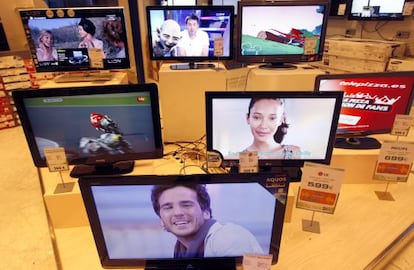Digital disaster zone
So much was promised of DTT, but the reality has been a crushing disappointment

Getting the respective presidents, CEOs and other heavyweights from the world of Spanish television together in the same place at the same time is no easy task, and much less at a time when their companies are all doing well. But the launch of Digital Terrestrial Television (DTT) in Spain, on December 12, 2005 was an occasion nobody wanted to miss.
The event, described by then Industry Minister José Montilla as "a revolution," took place at Madrid's Barajas airport. The mood was upbeat, and blissfully unaware of the coming financial apocalypse, the talk was of new business opportunities.
The next day, the newspapers were full of stories about how we would all soon be doing our shopping via television, accessing our emails via the screen. A new information era was about to begin, with promises of high quality television programming. Surely the last bit was possible, wasn't it?
"The whole thing has been an unparalleled disaster, a technological opportunity lost," says Rafael Díaz Arias from his office in the Information Sciences faculty at Madrid's Complutense University.
"Things are very bad, and it is not possible to see how we can really mend them. There was no planning. We don't need so many channels, the regional governments have adjudicated bids to their chums, and the bubble is now in the process of bursting," Díaz Arias adds.
The launch was called a "revolution" and talk was of new opportunities
Not everybody shares this pessimistic assessment, although most industry analysts and those working in the sector agree that DTT's roll-out in Spain could have been better prepared and carried out. Nearly seven years on, the majority of channels are not even broadcasting in full High Definition, many of the franchises were handed out based on political criteria; growing numbers of companies are returning their broadcasting licenses due to the drastic cuts in advertising; and in a bid to recoup some of their investment, some new channels are renting out their signal to bigger broadcasters.
"There was a serious lack of planning, which was made worse by the crisis," says Jordi Bosch, the president of Endemol España, the production company responsible for the reality show Big Brother.
The office of the Secretary of State for Telecommunications and the Information Society (SETSI) is currently negotiating with private operators to relocate their frequencies. Assigning more space to cellphone operators for 4G services requires freeing up frequencies being used at the moment by DTT operators. Could this constitute an ideal opportunity to overhaul the system?
Recent weeks have seen a war of words between the SETSI and the private television stations, with the government threatening to close some channels as part of a restructuring operation. For the moment, it looks as though the cost of any such restructuring will be borne by the taxpayer.
The bidding round for frequencies between Telefónica, Vodafone and Orange at the end of 2011 earned the state 1.3 billion euros, according to FENITEL, the body that represents Spain's telecommunications installation companies. Miguel Sebastián, the former industry minister under Prime Minister José Luis Rodríguez Zapatero's Socialist Party government, announced in May 2011 that 800 million euros of that money would be spent on new antenna infrastructure, rather than the taxpayer picking up the tab.
"A few weeks ago, the government announced that it would only be funding the process partially," says Alejandro Perales, president of the AUC, a body that represents Spanish communications consumers. Some 1.3 million Spanish households need their antennas repositioned, and they will have to pay for it. Miguel Ángel García Argüelles, the director general of FENITEL, estimates a cost of 400 euros per building. The average cost per household is around 20 euros.
The whole thing has been a complete botch, and nobody gives a damn!"
"There should be a complete subsidy to pay for this," says Perales. "This is not a problem created by consumers, and they have enough to bear with the current crisis."
Alejandro Perales of AUC says he finds it hard to accept that consumers are going to be asked to pay a second time for a DTT that no longer offers what was promised. He says that for a start, consumers are not even getting full High Definition. "The private channels broadcast a fake High Definition, which is basically dishonest."
More importantly, he says that the programming available on DTT is generally of poor quality, citing the example of Spanish news channel CNN+ being replaced by Big Brother 24 Hours . He also points to a lack of supervision regarding small, local channels.
"There are a huge number of illegal channels that are broadcasting porn films or tarot reading during the day, which they are not allowed to do. The whole thing is chaotic, and the time has come to organize the sector."
Miquel Francés, who runs a masters program in audiovisual content and format at the University of Valencia, says that DTT has made no contribution to a more independent media. "DTT has simply produced a huge number of programs that nobody wants to see, and has certainly failed to meet the needs of viewers," he says.
Some 1.3 million households will now have to pay to have antennas adjusted
He says that the main reason for the failure of DTT in Spain is the lack of a regulator, as in France or Germany. The Zapatero administration intended to set up such a body, but the current government has given no indication that it intends to do so.
Jesús Casado, formerly director of institutional relations at Philips, says that the success of the British Freeview model is largely due to the presence of an independent regulatory body, in this case, Ofcom. "Ofcom made sure that channels were obliged to respect formats, contents and programming standards," he says. In contrast, in Spain, private operators joined together precisely to prevent the previous government from establishing any kind of regulatory body.
"In this country nobody complied with the formatting requirements of HD, sound quality, internet links, subtitling or help for the blind. The whole thing has been a complete botch, and nobody gives a damn!" he says.
Ian Burrel, who writes about the media for British daily The Independent , says that regulators in the UK, Europe's pioneer provider of pay-per-view television, keep a close watch on operators to make sure that a percentage of programming is serving the public interest. "This approach is widely accepted in the UK, and it means that people on a low income can be guaranteed access to television of a reasonable standard," says Burrel.
Eladio Gutiérrez, the man largely responsible for overseeing the move from analogical to digital television, admits that DTT has largely failed to deliver on its promises.
"The introduction of DTT was a success, although with hindsight it is obvious that some aspects could have been handled better." He believes that with more pay-per-view channels, it could still be a viable project, and that the move to the system should have been delayed until HD televisions were available in Spain. "We needed legislation obliging shops to make the move to sell only HD televisions. That is why broadcasters didn't bother to make programs in full HD: they argued that few viewers would notice the difference."
Gutiérrez says that giving Cuatro and laSexta analogical licenses simply increased competition in a fast-shrinking advertising market, and meant that neither channel could survive and would end up being absorbed by bigger players. Two weeks ago, the country's monopoly commission approved the merger of Antena 3 and laSexta.
DTT is a success, although some aspects could have been handled better"
Sources in the media industry say that the decision to give analogical licenses to Cuatro and laSexta was based on political considerations under the previous government in a bid to balance the domination of two channels that support the Popular Party, Antena 3 and Telecinco, with two more left-leaning broadcasters. All that happened was that Cuatro and laSexta were unable to attract advertisers. Ricardo Vaca of Barlovento Comunicaciones says that in 2007, television advertising was worth a total of 3.5 billion euros; by 2011, that figure had shrunk to 2.2 billion. He believes it will be down to less than two billion for this year.
The problem was made worse by giving each private station four channels to broadcast in digital. "In this country, we simply handed out multiplex channels rather than allowing broadcasters to grow and consolidate, as happened for example in France," says Jordi Bosch.
Miquel Francés sums up the situation thus: "Analogical licenses were handed out to avoid the duopoly of Antena 3 and Telecinco, and here we are back with the duopoly. The reality of TDT is more quantity and less quality."
Berndt Reichart, the head of Neox, Nova and Nitro, three thematic channels belonging to Antena 3, disagrees. "There are debates, film, documentaries, children's programming: there is much more choice available now. Viewers have been given more choice." Ricardo Vaca points out that viewers last year spent an extra five minutes a day watching television. "What people are talking about on the social networks is television," he points out.
Álex Martínez Roig, the head of programming at the pay channel Canal Plus, believes that TDT has failed to offer viewers more quality programming: "There are simply too many channels all offering the same thing."
Alejandro Perales of AUC agrees that there are too many channels: "It would have been much better to have limited the number of channels and to have guaranteed better quality programming."
The outcome is that companies are returning their licenses. Groups like Veo Television have sublet their frequencies. "The television channels are effectively auctioning off what is a public asset, a television frequency," says Paco Pérez, the founder of Tele K. "It's the same as allowing somebody to buy a piece of farmland in a protected area and to then allow the buyer to sell it on to a property developer. We are simply following the same model as always, which is to look for the quick buck without thinking long term." There is money to be made from renting out frequencies, which many in the industry says explains why some license holders are refusing to return their broadcasting permits.
"This is the moment to reorder the sector, when there is a shortage of band width, and to close the illegal stations that are giving DTT a bad name," says Eladio Gutiérrez. "There are some that are broadcasting porn films all day long, interspersed with tarot readers... We have to do something about this, otherwise all we will prove is that this is not a country to be taken seriously."
Tu suscripción se está usando en otro dispositivo
¿Quieres añadir otro usuario a tu suscripción?
Si continúas leyendo en este dispositivo, no se podrá leer en el otro.
FlechaTu suscripción se está usando en otro dispositivo y solo puedes acceder a EL PAÍS desde un dispositivo a la vez.
Si quieres compartir tu cuenta, cambia tu suscripción a la modalidad Premium, así podrás añadir otro usuario. Cada uno accederá con su propia cuenta de email, lo que os permitirá personalizar vuestra experiencia en EL PAÍS.
¿Tienes una suscripción de empresa? Accede aquí para contratar más cuentas.
En el caso de no saber quién está usando tu cuenta, te recomendamos cambiar tu contraseña aquí.
Si decides continuar compartiendo tu cuenta, este mensaje se mostrará en tu dispositivo y en el de la otra persona que está usando tu cuenta de forma indefinida, afectando a tu experiencia de lectura. Puedes consultar aquí los términos y condiciones de la suscripción digital.









































